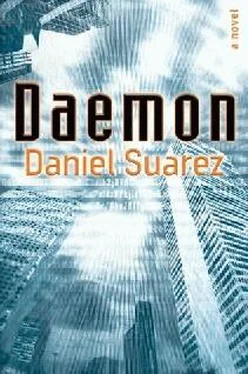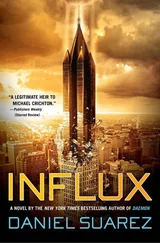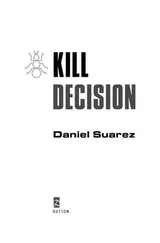They were just two people who got lost somewhere early in life.
Chris, their son, had come to see Sebeck only once and stared at the floor almost the entire time. When he did look up, there was a glare of utter malevolence through the glass that stung Sebeck worse than anything the federal prosecutor could say. It still stung.
Sebeck curled up on his cot around a pain so deep that he longed for it all to end. There was no clearing this up—even if proof of his innocence were found. His name had been too thoroughly dragged through the mud. Some taint would always remain. Some doubt would always exist in the minds of those around him. Death would be welcome, if it weren’t for the fact that almost everyone he cared about considered him evil. That his passing would be seen as justice. He was thankful his parents hadn’t lived to see this day.
But his deepest despair came from the knowledge that no one believed that the Daemon existed. From the outset it was clear that both the prosecution and the defense would be arguing not about the Daemon, but about whether Sebeck had been involved in the conspiracy to defraud Sobol’s estate and murder federal officers. The judge refused to hear testimony about the Daemon—largely because there was no evidence it existed. But it had to exist. Sebeck was convinced of it.
They were appealing his conviction to a higher federal court, but his lawyer didn’t hold out much hope. The government was clearly making an example out of Sebeck. His trial had been fast-tracked in response to public outrage, and failing the introduction of new evidence, there was little chance his guilty verdicts would be overturned on appeal.
Sebeck tried to remember a time when he was last truly happy. He had to think back all the way to high school, sitting on the roof of his neighbor’s garage with his buddies. That was the night before he found out Laura was pregnant. But was that true? Now the idea of coming home and seeing Chris and Laura laughing at the kitchen table was a treasured memory. The laughter stopped as he arrived, but that wasn’t their fault. It was his fault. He had purposefully distanced himself from them. Without this disaster, would Sebeck ever have realized what he had?
Sebeck’s mind turned to that voice on the phone at Sobol’s funeral. Experts proved it wasn’t Sobol, but Sebeck realized that was the whole point of it. It had to not be Sobol, and provably so. Nonetheless, that voice had actually warned him about what was to come.
I must destroy you.
He contemplated it emptily. Without hope or purpose.
But there was something else the voice had said. Sebeck tried hard to remember, buried as it was under months of pretrial testimony, interrogations, and hard evidence. But then it came to him.
They will require a sacrifice, Sergeant .
And so they had. Sebeck sat up and stared into nothingness, straining to recall the exact words of the voice.
Before you die…invoke the Daemon.
Somewhere there was a surveillance tape that showed Sebeck silently nodding to himself in the stillness of his empty cell. Because he now realized what he had to do.
A white van raised a cloud of dust as it approached from a distance, wavering like a phantom in the summer heat. On either side of the dirt road, California grasslands stretched brown and dry, rolling up into the barren hills at the southern end of the San Joaquin Valley. Every fold and furrow of the land was shadowed in the afternoon sun, like the wrinkles of some timeworn face. The topography was naked and enormously wide. Forty miles of nothing stretched to the horizon, starkly beautiful to anyone with a reliable car.
The van inched across the gargantuan landscape, progressing toward a ring of asphalt set in the bottom of a forgotten canyon. The van slowed as it reached the track, then turned, revealing the car-carrying trailer it pulled behind it. A black Lincoln Town Car sat on the bed.
The van stopped, and a moment later the doors swung open, disgorging Kurt Voelker on the passenger side. He wearily stretched. Tingit Khan and Rob McCruder exited the far side of the van and did likewise. They were all in their early twenties, but while Voelker looked dressed for a Christian Fellowship meeting—with khakis and a button-down shirt—Khan and McCruder bore the piercings, tats, and severe hair that once indicated disaffected youth but that now only meant they weren’t interviewing yet.
Voelker checked his GPS unit. He looked to his two companions. “We’re in the box.”
“It’s about fucking time.” Khan held up his hand to shade his face. His eyes scanned the terrain. “What is this? A racetrack?”
“Pretty damned small for a racetrack.”
Voelker spoke from the far side of the van. “I’m guessing a test track.”
“It’s not banked or anything.” Khan held up his other hand to block the sun. “What’s it feel like? A hundred degrees out here?”
McCruder checked his watch. “A hundred and six.”
“You have a thermometer on your watch?”
“Yeah. So what?”
Khan looked through the van windows to Voelker on the other side. “Kurt. Rob has a thermometer on his watch.”
“So?”
“Well, at some point, the thing you add to the watch is more significant than the watch. I’d argue he’s wearing a thermometer with a clock on it.”
McCruder scowled; he was a veteran of Khan’s observations. “Fuck off.”
“Why do you need to know the precise temperature where you are ? It’s not like a weather report; it’s too fucking late—you’re already here.”
Voelker held up a hand. “Khan, get the gear out of the van. I’ll un-chain the car.”
Khan and McCruder started pulling hard-shell Pelican cases from the van. McCruder just shook his head sadly. “You’re the one who asked how hot it was.”
* * *
Fifteen minutes later Voelker extended the antenna on a sizeable handheld remote controller. Khan and McCruder sat nearby on the empty hard-shell containers in front of a folding table. The table was strewn with cables, high-gain antennas, and two ruggedized laptops with shades shielding their screens from the sunlight. A half-meter satellite dish pointed skyward on a tripod placed in the grass nearby.
Voelker looked to McCruder, who was peering at his laptop’s LCD screen. McCruder finally nodded. “Anytime, Kurt.”
Voelker pointed the controller directly at the Lincoln on the trailer bed. The car looked identical to the endless number of black fleet Town Cars with smoked glass coursing through downtown streets and airports nationwide—replete with a TCP number on its back bumper and a vanity plate reading LIVRY47. Voelker pressed a button on the remote. The car’s V8 engine started. He slid a lever to put it in gear and then began backing the car slowly off the trailer ramps.
“I bet he rolls it,” McCruder snickered.
“You’d better hope he doesn’t.”
Voelker didn’t even look. “Guys, I’m working here. You wanna shut your pie holes for two seconds?”
In a few moments he had deftly backed the car onto the dirt road; then he shifted it into drive and eased it out onto the asphalt of the small oval racetrack nearby. The circuit was perhaps two hundred feet in diameter. An oddity, really. Nothing you could actually race on. It was crisscrossed with mysterious grooves set at odd angles.
“This good?” Voelker turned to his companions.
They shrugged.
Khan took a lollipop out of his mouth. “How the hell are we supposed to know? We’re in the box. Park it where it is.”
Voelker killed the engine. He collapsed the controller’s antenna. “Anything?”
Читать дальше












